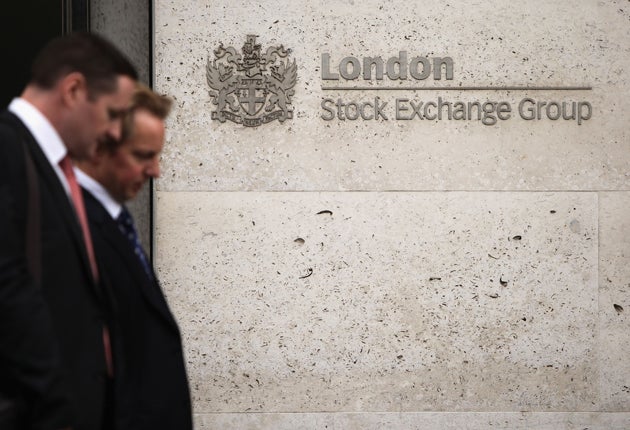
Your support helps us to tell the story
From reproductive rights to climate change to Big Tech, The Independent is on the ground when the story is developing. Whether it's investigating the financials of Elon Musk's pro-Trump PAC or producing our latest documentary, 'The A Word', which shines a light on the American women fighting for reproductive rights, we know how important it is to parse out the facts from the messaging.
At such a critical moment in US history, we need reporters on the ground. Your donation allows us to keep sending journalists to speak to both sides of the story.
The Independent is trusted by Americans across the entire political spectrum. And unlike many other quality news outlets, we choose not to lock Americans out of our reporting and analysis with paywalls. We believe quality journalism should be available to everyone, paid for by those who can afford it.
Your support makes all the difference.London's top shares index swung wildly today as jumpy investors digested emerging details of a eurozone rescue plan which would reportedly allow Greece to default on half its debts.
The FTSE 100 Index dropped nearly 100 points to below the 5,000 mark before a stuttering recovery saw it close 0.4% higher.
The International Monetary Fund (IMF) is working on a series of emergency measures to rescue the euro, thought to cost two to €3 trillion (£2.6 trillion).
European markets experienced a stronger rally, with Germany's Dax closing nearly 3% higher and France's Cac-40 finishing nearly 2% ahead.
Britain's top 100 companies saw £78 billion wiped from their value last week as the sovereign debt crisis and America's creaking public finances fuelled fears of another global recession.
Yusuf Heusen, sales trader at IG Index, said markets were giving politicians the benefit of the doubt over resolving the Greek debt crisis - but warned that the patience was unlikely to last.
Mr Heusen warned that if plans did not emerge in the next few days, shares could experience "another lurch back to the August lows".
Pumping cash into at least 16 of Europe's beleaguered banks is the cornerstone of a rumoured three-pronged plan being discussed to save the single currency.
The shoring-up of vulnerable banks would allow Greece to partly default on its debt - wiping billions of pounds from the country's balance sheet and allowing the country to remain within the eurozone.
The third part of the plan involves providing additional firepower for the European Financial Stability Facility (EFSF) - the bailout fund - which could cost trillions of euros.
But markets analyst Louise Cooper, of BGC Partners, warned today's swing of nearly 175 points on the FTSE 100 reflected a "deeply uncertain" future.
She said: "A sufficiently credible plan to solve the eurozone crisis will necessitate changes to treaties, laws, and not least the German constitution. There will be wobbles and uncertainty at every vote and stage of political implementation.
"And then we have the problem that the voters in each country are unlikely to be keen on the solution and have not had the downside risks explained to them in sufficient detail.
"So what have we to look forward to? Continued financial uncertainty, high volatility and nervousness."
Britain's top 100 companies saw 5.65%, or £78 billion, wiped from their value last week as the sovereign debt crisis and America's creaking public finances fuelled fears of another global recession.
Asian markets saw fresh falls overnight, with Japan's Nikkei 225 Index down more than 2% and the Hang Seng Index in Hong Kong off nearly 3% as nervousness about the eurozone crisis continued.
Chancellor George Osborne warned over the weekend that decisive action was required within six weeks as the world had reached a "dangerous phase" amid fears of a renewed recession.
But he said he was "optimistic" that the gathering of colleagues from the G20 nations and a meeting of the IMF had made progress.
Elsewhere, IMF managing director Christine Lagarde moved to reassure markets and said the annual meeting had seen a "common diagnosis and a shared sense of common purpose".
The situation remained "precarious", the IMF noted, and it suggested it may not have the funds to bail out larger eurozone economies if the crisis is allowed to spread.
Later this week, the focus will return to Greece as the European Central Bank, European Commission and IMF - the troika - will head back to Athens for the latest round of talks with officials over the next tranche of its €8 billion (£7 billion) loan instalment.
PA
Join our commenting forum
Join thought-provoking conversations, follow other Independent readers and see their replies
Comments